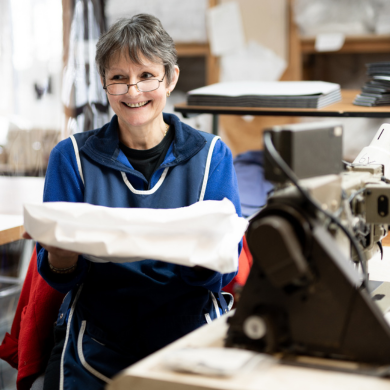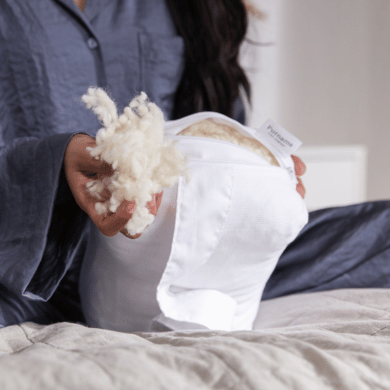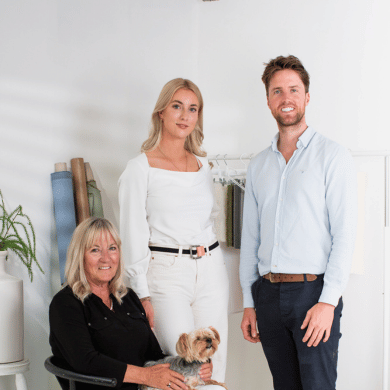
Choisir le bon oreiller biologique pour soulager l'apnée du sommeil
L'apnée du sommeil peut transformer une bonne nuit de sommeil en cauchemar. Pour des millions de personnes atteintes dans le monde, cette maladie perturbe le sommeil, a des répercussions sur la santé et diminue la qualité de vie. Et si la solution pour mieux dormir ne résidait pas dans des appareils médicaux coûteux, mais dans quelque chose d'aussi simple que votre oreiller ?
Voyons comment le choix du bon oreiller peut faire toute la différence pour ceux qui luttent contre l’apnée du sommeil.
Comprendre l’apnée du sommeil : bien plus qu’un simple ronflement bruyant
Avant de commencer, il est essentiel de comprendre ce qu’est réellement l’apnée du sommeil.
Contrairement à la croyance populaire, il ne s'agit pas seulement de ronfler assez fort pour réveiller les voisins. L'apnée du sommeil est un trouble grave du sommeil dans lequel la respiration s'arrête et redémarre de manière répétée pendant le sommeil.
Il existe trois principaux types d’apnée du sommeil :
- Apnée obstructive du sommeil (AOS) : la forme la plus courante, où les muscles de la gorge se relâchent et bloquent les voies respiratoires.
- Apnée centrale du sommeil : moins courante, survenant lorsque le cerveau n'envoie pas de signaux appropriés aux muscles qui contrôlent la respiration.
- Syndrome d’apnée complexe du sommeil : une combinaison d’apnée obstructive et d’apnée centrale du sommeil.
La prévalence de l’apnée du sommeil est stupéfiante.
Au Royaume-Uni seulement, on estime que jusqu'à 10 millions de personnes souffrent d'apnée obstructive du sommeil, et de nombreux cas ne sont pas diagnostiqués (Sleep Apnoea Trust) . Cette épidémie silencieuse touche non seulement les hommes âgés et en surpoids, mais aussi des personnes de tous âges, de tous sexes et de toutes morphologies.
Le rôle de l'oreiller dans la gestion de l'apnée du sommeil
Vous vous demandez peut-être comment un oreiller peut aider à soulager un trouble respiratoire. La réponse réside dans la relation complexe entre la posture de sommeil et l'obstruction des voies respiratoires.
Le bon oreiller peut :
- Favoriser une position de sommeil optimale
- Réduire la pression sur les voies respiratoires
- Accueillir les équipements CPAP
- Améliorer le confort général du sommeil
Décomposons chacun de ces avantages plus en détail.
Favoriser une position de sommeil optimale
La position de sommeil joue un rôle crucial dans la gestion de l’apnée du sommeil. Dormir sur le dos peut aggraver les symptômes en permettant à la langue et au palais mou de s’affaisser au fond de la gorge. Un oreiller bien conçu peut encourager le sommeil sur le côté, ce qui aide à garder les voies respiratoires ouvertes.
Certains oreillers sont spécialement conçus pour favoriser le sommeil sur le côté. Ces oreillers ont souvent un côté plus haut pour soutenir le cou et un centre plus bas pour soutenir confortablement la tête.
Réduire la pression sur les voies respiratoires
L'angle de votre tête et de votre cou pendant le sommeil peut avoir un impact significatif sur l'obstruction des voies respiratoires. Un oreiller qui offre le niveau de soutien adéquat peut aider à maintenir un bon alignement, réduisant ainsi la pression sur les voies respiratoires.
Les oreillers conçus pour l'apnée du sommeil ont souvent une forme légèrement inclinée ou en coin. Cette élévation peut aider à empêcher la langue de retomber et de bloquer les voies respiratoires.
Adapté aux équipements CPAP
Pour les personnes utilisant des appareils à pression positive continue (CPAP) , trouver une position de sommeil confortable peut être difficile. Les oreillers CPAP spécialisés sont conçus avec des sections découpées pour accueillir les sangles et les tubes du masque, réduisant ainsi les fuites du masque et améliorant le confort général.
Ces oreillers peuvent faire une différence significative dans l'observance du traitement CPAP. Comme le souligne le Dr Yerem Yeghiazarians , professeur de médecine à l'Université de Californie à San Francisco,
« Les patients signalent une meilleure humeur, moins de ronflements, moins de somnolence diurne, une meilleure qualité de vie et une meilleure productivité au travail grâce au traitement de l'AOS. »
Améliorer le confort général du sommeil
Au-delà des bénéfices spécifiques pour l'apnée du sommeil, un bon oreiller rend tout simplement le sommeil plus confortable. Lorsque vous êtes à l'aise, vous avez plus de chances de maintenir une position de sommeil bénéfique tout au long de la nuit.
Choisir le bon oreiller pour soulager l'apnée du sommeil
Maintenant que nous comprenons l’importance des oreillers dans la gestion de l’apnée du sommeil, comment choisir le bon ? Voici quelques facteurs à prendre en compte :
Questions matérielles
Le matériau de votre oreiller peut avoir un impact significatif sur la qualité de votre sommeil. Les options incluent :
- Mousse à mémoire de forme : s'adapte à votre tête et à votre cou pour un soutien personnalisé.
- Latex : Offre un soutien ferme et est naturellement hypoallergénique.
- Fibre de polyester : Offre un toucher plus doux et est souvent plus abordable.
- Matériaux naturels : Des options comme les cosses de sarrasin ou la laine britannique offrent respirabilité et régulation de la température.
Pour les personnes souffrant d’apnée du sommeil, les matériaux hypoallergéniques peuvent être particulièrement bénéfiques car ils réduisent le risque de réactions allergiques qui pourraient obstruer davantage la respiration.
Fermeté et soutien
La fermeté idéale dépend de votre position de sommeil et de vos préférences personnelles. Les personnes qui dorment sur le côté ont généralement besoin d'un oreiller plus ferme pour maintenir un bon alignement de la colonne vertébrale, tandis que celles qui dorment sur le dos peuvent préférer un oreiller moyennement ferme.
Pour gérer l'apnée du sommeil, il est essentiel de disposer d'un oreiller suffisamment ferme pour conserver sa forme tout au long de la nuit. Cela garantit un soutien constant de votre tête et de votre cou.
Forme et design
Les oreillers conçus spécifiquement pour l'apnée du sommeil ont souvent des formes uniques. Celles-ci peuvent inclure :
- Oreillers profilés avec un côté plus haut pour dormir sur le côté
- Oreillers compensés pour un sommeil surélevé
- Coussins CPAP avec découpes pour l'insertion du masque
Tenez compte de votre position de sommeil principale et de la question de savoir si vous utilisez un équipement CPAP lorsque vous choisissez la forme de votre oreiller.
La taille compte
Assurez-vous que l'oreiller est de la bonne taille pour votre lit et votre corps. Un oreiller trop grand ou trop petit peut entraîner un mauvais positionnement et une efficacité réduite.
Des avis d'experts et des expériences concrètes
Bien que la théorie derrière le choix de l'oreiller soit importante, les expériences du monde réel peuvent fournir des informations précieuses. De nombreuses personnes souffrant d'apnée du sommeil signalent une amélioration significative de la qualité de leur sommeil après avoir trouvé le bon oreiller.
Un utilisateur de l' oreiller CPAP original de Putnams a partagé :
« J'ai beaucoup mieux dormi avec cet oreiller. Il faut encore un peu de temps pour trouver la bonne position, mais c'est beaucoup plus facile qu'avec un oreiller normal. »
Un autre utilisateur a commenté,
« Cet oreiller est beaucoup plus ferme que ce à quoi je m'attendais, mais je pense que je le préfère à la mousse à mémoire de forme. J'ai encore quelques mauvaises nuits de sommeil, mais soyons honnêtes, le masque n'est pas très confortable. Je le recommande vivement. »
Ces témoignages soulignent le caractère personnel du choix d'un oreiller. Ce qui fonctionne pour une personne peut ne pas fonctionner pour une autre, ce qui souligne l'importance d'essayer différentes options.
Au-delà de l’oreiller : gestion holistique de l’apnée du sommeil
Bien que le choix du bon oreiller soit crucial, il est important de se rappeler qu'il ne s'agit que d'une partie d'une stratégie globale de gestion de l'apnée du sommeil. D'autres étapes importantes incluent :
- Gestion du poids : l’excès de poids peut contribuer à l’obstruction des voies respiratoires.
- Éviter l’alcool et les sédatifs : ils peuvent détendre les muscles de la gorge et aggraver les symptômes.
- Établir un horaire de sommeil cohérent : des habitudes de sommeil régulières peuvent améliorer la qualité globale du sommeil.
- Utiliser un humidificateur : cela peut aider à réduire la sécheresse et l’irritation des voies respiratoires.
- Exercice régulier : l’activité physique peut améliorer la qualité du sommeil et réduire la gravité de l’apnée du sommeil.
L'avenir de la gestion de l'apnée du sommeil
À mesure que notre compréhension de l’apnée du sommeil s’améliore, la technologie disponible pour la gérer évolue également. Des oreillers intelligents qui s’ajustent tout au long de la nuit aux machines CPAP alimentées par l’IA, l’avenir de la gestion de l’apnée du sommeil semble prometteur.
Cependant, les principes fondamentaux d’une bonne hygiène du sommeil et d’une bonne posture de sommeil resteront toujours importants. Le simple oreiller, sous ses différentes formes, continuera de jouer un rôle crucial pour aider des millions de personnes à mieux respirer et à mieux dormir.
Passer à l’étape suivante
Si vous souffrez d'apnée du sommeil, ne sous-estimez pas le pouvoir d'un bon oreiller. Il pourrait être la clé pour un meilleur sommeil et une meilleure santé générale. Pensez à essayer un oreiller spécialisé pour l'apnée du sommeil, comme l' oreiller CPAP Original de Putnams, qui a été recommandé par la British Snoring & Sleep Apnoea Association.
N’oubliez pas que les besoins de chacun sont différents.
Ce qui fonctionne pour une personne peut ne pas fonctionner pour une autre. Soyez patient et prêt à expérimenter différentes options jusqu'à ce que vous trouviez l'oreiller parfait pour vos besoins.
L’apnée du sommeil peut être une condition difficile, mais avec les bons outils et les bonnes connaissances, vous pouvez prendre le contrôle de votre sommeil et vous réveiller en vous sentant rafraîchi et revitalisé.
Faites de beaux rêves, j'espère !


















Laissez un commentaire